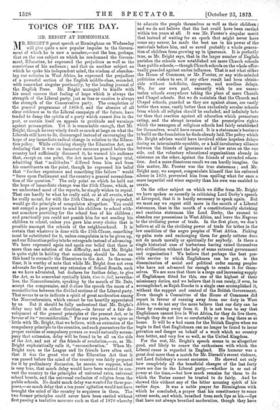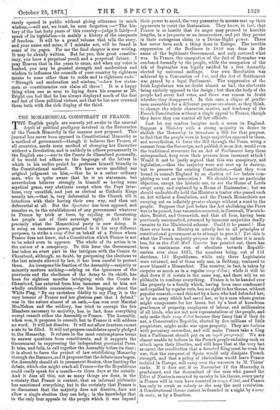TOPICS OF THE DAY.
MR. BRIGHT AT BIRMINGHAM.
ATR. BRIGHT'S great speech at Birmingham on Wednesday will give quite a new popular impulse to the Govern- ment of which he is now a member,—not the less, perhaps, that on the one subject on which he condemned the Govern- ment, Education, he expressed the prejudices as well as the convictions of his audience ; and that on another subject on which he spoke his independent mind, the wisdom of abandon- ing our colonies in West Africa, he expressed the prejudices of a powerful section of the English middle-class, seconded, with somewhat singular pertinacity, by the leading journal of the English Press. Mr. Bright managed to kindle with his usual success that feeling of hope which is always the strength of the Liberal party, just as fear or caution is always the strength of the Conservative party. The completion of the general programme of 1868-9, and the absence of all clear evidence as to the Liberal campaign of the future, have tended to damp the spirits of a party which cannot live in the past, or sustain itself on appeals to gratitude and warnings against presumption. Yet it is remarkable enough, that Mr. Bright, though he very wisely dwelt so much at large on what the Liberals still have to do, discouraged instead of encouraging the hope of any immediate radical change in relation to the Educa- tion policy. While criticising sharply the Education Act, and declaring that it was an immature measure passed before the country had sufficiently discussed it, he warned his audience that, except on one point, the Act must have a longer trial, admitting that " multitudes " differed from him and from his constituents on the point, though he expressed his belief that " further experience and something like failure " would " force upon Parliament and the country a general reconsidera- tion of the question." The only point on which he held out the hope of immediate change was the 25th Clause, which, as we understand most of the reports, he simply wishes to repeal. That can hardly be what he really said, or at all events, what he really meant, for with the 25th Clause, if simply repealed, would go the principle of compulsion altogether. You could not compel a poor parent to send his children to school with- out somehow providing for the school fees of his children ; and practically you could not punish him for not sending his children to school, unless you gave him every choice that is possible amongst the schools of the neighbourhood. It is certain that whatever is done with the 25th Clause, something must be substituted for it, unless compulsion is to be given up, and our Education policy is to be retrograde instead of advancing. We have expressed again and again our belief that there is more than one solution of the difficulty, and that Mr. Bright is quite right in holding that something should be done on this head to reconcile the Dissenters to the Act. In the mean- time, it is worthy of note that while Mr. Bright does not even advocate for the present any extension of School Boards, such as we have advocated, but declares for further delay, to give the Act, as he somewhat cynically hints, time to fail, neverthe- less, the Nonconformists, speaking by the mouth of Mr. Dale, accept the compromise, and declare the speech the omen of a reconciliation between the divided sections of the Liberal party. That seems to us to indicate a spirit of great moderation among the Nonconformists, which cannot be too heartily appreciated by us. But it should be fully understood that Mr. Bright's delay may tell in either direction,—in favour of a fair de- velopment of the general principles of the present Act, or in favour of its " reconsideration." For our own parts, we agree so • little with Mr. Bright, that we believe, with an extension of the compulsory principle to the counties, and such guarantees for the proper exercise of compulsory powers as would naturally accom- pany that extension, delay will be found to be all on the side of the Act, and not of the friends of revolution,—or, as Mr. Bright euphuistically calls it, "reconsideration." When Mr. Bright says, as the League and its friends have often said, that it was the great vice of the Education Act that it was passed before the mind of the country was fairly prepared for it by preliminary discussion, he means, we suppose, what is very true, that much delay would have been wanted to con- vert the country to the principles of universal rates, universal school boards, and the universal exclusion of religion from the public schools. No doubt much delay was wanted for these pur- poses,—so much delay that a ten years' agitation would not have brought the mind of the country to acquiesce in them. The two former principles could never have been carried without first passing a tentative measure such as that of 1870 whereby to educate the people themselves as well as their children; and we do not believe that the last could have been carried within ten years at all. It was Mr. Forster's singular merit that instead of waiting for an epoch that might never have come any nearer, he made the best use in his power of the materials before him, and so saved .probably a whole getsera- tion of children from growing up in Ignorance. It is perfectly true, as Mr. Bright says, that in the larger number of English parishes the schools now established are more Church schools than public schools,—though Church schools on the whole effec- tually guarded against undue influence. That is not what either the House of Commons, or Mr. Forster, or any wide-minded politician wishes to see, if any other result had been obtain- able without indefinite, dangerous, and needless delays. We, for our own part, earnestly wish to see unsec- tartan schools everywhere taking the place of mere Church and Chapel schools. But we do maintain that the Church and Chapel schools, guarded as they are against abuse, are vastly better than none, vastly better than exclusively secular schools from which all religion should be excluded, and infinitely bet- ter than that reaction against all education which premature rating, and the abrupt invasion of the prescriptive rights which the managers of religious schools had fairly established for themselves, would have caused. It is a statesman's business to build on the foundation he finds already laid. The policy which Mr. Bright advises would have involved either hopeless delays during an interminable squabble, or a half-involuntary alliance between the friends of ignorance and of low rates on the one side, and the voluntary educational organisations already in existence on the other, against the friends of extended educa- tion. And a more disastrous result we can hardly imagine. OD this matter, Mr. Forster was the true statesman ; and Mr. Bright may, we suspect, congratulate himself that his enforced silence in 1870, prevented him from spoiling what for once a more impartial and wiser sagacity than his own was enabled to. create.
On the other subject on which we differ from Mr. Bright we have spoken so recently in criticising Lord Derby's speech at Liverpool, that it is hardly necessary to speak again. But we must say we regret still more in the mouth of a Liberal statesman, than in the mouth of a constitutionally shrinking and cautious statesman like Lord Derby, the counsel to abandon our possessions in West Africa, and leave the Negroes to the' civilising power of trade. In the first place we don't believe at all 'in the, civilising power of trade for tribes in the low condition of the negro peoples of West Africa. Picking up palm nuts and exchanging them for gaudy cottons does not do much morally or spiritually for anybody. Is there a single historical case of barbarians having raised themselves into civilisation without the help of some external government and organisation ? We believe that perhaps the best pos- sible service to which Englishmen can be put, is the dissemination of social and political order among peoples who have not advanced far enough to create it for them- selves. We are sure that there is a large andincreasing supply of Englishmen fitted for this, one of the highest of their missionary duties, and we believe that it can rarely, if ever, be accomplished, as Rajah Brooke in a single case accomplished it, without the support and control of the British Government. Even though a Committee of the House of Commons did report in favour of running away from our duty in West Africa, we do not any the more believe that our duty can be done by running away from it. It is not true to • say that Englishmen cannot live in West Africa, for they do live there, though they do not live so comfortably or so long there as at home. It will be a bad omen for the British Empire when we begin to find that Englishmen can no longer be found to incur privation and danger on behalf of a work which no country does better, and very few so well, as the United Kingdom.
For the rest, Mr. Bright's speech seems to us altogether good, and likely to renew the enthusiasm with which the Liberal cause is regarded in England. His humour was a great deal more than a match for Mr. Disraeli's recent violence, and Lord Salisbury's recent sarcasms. He showed not only how completely all the beneficial changes of the last forty years are due to the Liberal party,—whether in or out of power at the time,—but how much remains for them to do which the Tories cannot be trusted to do fairly. And he showed this without any of the bitter accusing spirit of his earlier days. It was a noble prayer for Birmingham with which he concluded, a prayer that his constituency to some extent needs, and which, breathed from such lips as his,—lips that have not always breathed moderation, though they have rarely opened in public without giving utterance to much wisdom,—will not, we trust, be soon forgotten :—" The his- tory of the last forty years of this country—judge it fairly—I speak of its legislation—is mainly a history of the conquests of freedom. It will be a grand volume that tells the stery, and your name and mine, if I mistake not, will be found in some of its pages. For me the final chapter is now writing. It may be already written. But for you, this great constitu- ency, you have a perpetual youth and a perpetual future. I pray Heaven that in the years to come, and when my voice is hushed, you may be granted strength and moderation and wisdom to influence the councils of your country by righteous means to none other than to noble and to righteous ends." " Strength and moderation and wisdom,"—how few states- men or constituencies can claim all three ! It is a happy thing when one as near to laying down his armour as Mr. Bright can feel that he has always displayed much of the first and last of these political virtues, and that he has now crowned them both with the rich display of the third.







































 Previous page
Previous page